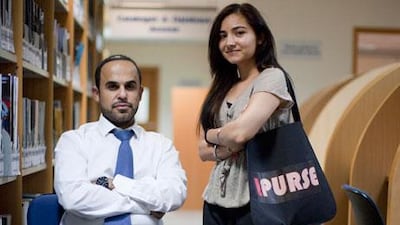DUBAI // The scenario is all too familiar. You buy something in a shop; as you fumble in your bag for your card, you take a few things out to find it. You pay, you leave.
Only when you get back to your car do you realise your blunder - you left your keys on the shop counter.
Just that situation unfolded one too many times for two Dubai students. And while most of us would simply chastise ourselves, and resolve to be more careful next time, they have come up with a neat technological way of preventing it.
As part of their final-year project Manprabhjot Kaur, 23, and Rashida Daruwala, 22, who both graduated last year in computer science from University of Wollongong Dubai, developed the iPurse, a smartphone app that scans the contents of your handbag to check you've got everything.
It uses radio frequency identification (RFID) tags - tiny, cheap tags that can be read electronically. The tags, which cost as little as 15 fils each, are already widely used in credit cards, road toll cards, and by shops to keep track on their stock. RFID readers are already built into many smartphones.
Users of the iPurse stick tiny tags to the items they want to keep track of - keys, wallet, lipstick. Then the app uses the smartphone's RFID reader to make sure it can "see" all the items that are supposed to be in the bag. If something's missing, an alert sounds.
It can have other uses, too. The owner can set reminders to make sure that have the things they need in their bag. For example, if you have a maths class on Monday, it can make sure your maths folder is in the bag - so long as the folder has a tag attached - and warn you if you're about to forget it.
The tags use near-field communication (NFC) technology, which works on a similar principle to Bluetooth but over shorter distances.
"Your range is less than Bluetooth," explains Ms Kaur, "which means your items won't get confused with other people's if they have the same app."
The app will let users give a higher priority to some items than others - so your purse, for example, will trigger an alert if it goes missing for even a minute, while lipstick might be allowed to go Awol for five minutes before the warning sounds. "You can set it for longer," said Ms Kaur. "But it will beep when things haven't been put back."
The app can also be linked to weather updates, reminding you to take a scarf if it's likely to be cold. "What makes this different to other simple tracking devices is its intelligence system," she added.
Ms Daruwala said the project had been challenging. "We had lows where we thought things wouldn't work, but we persisted till the end.
"Today, everyone knows and has heard about NFC - but when we started, it wasn't that pervasive. We had limited tools to develop - like working on an ancient Symbian 40 phone, because only that supported NFC at that time."
With the app currently working only on a now-obsolete Nokia phone, they now plan to create versions for more up-to-date phones - first Android, then the iPhone.
The university has registered a patent for the gadget and will now get to work upgrading the technology. Mohamed Watfa, the assistant professor who oversaw the project, expects the next version to be much more advanced and efficient.
In February, the pair published a paper on their invention in the International Journal of Intelligent Systems Technologies and Applications. Since then, they have been approached by several companies.
"The whole buzz around the project started after the paper was published," said Dr Watfa. "It's a big thing to embed technology into fashion. With a bit more work, they can develop it with new technology. With an Android phone, it is much easier to develop."
He hopes other students will follow the pair's entrepreneurial lead. "Many people are watching shows like Dragons Den and saying if they can do it, so can I," he said.
"Even in computer science, there is an element of business involved. In the GCC, entrepreneurship is a big thing. These girls showed a problem they were facing and found a solution for it."
For now, the challenge remains finding the right investor. "iPurse has generated so much interest that we are going to move forward," said Ms Daruwala, who, like Ms Kaur, is now employed by Microsoft.
"We need fashion companies to invest in this idea to build a complete product."

